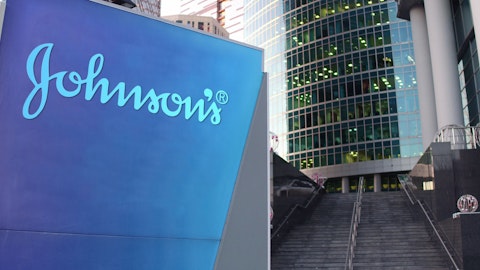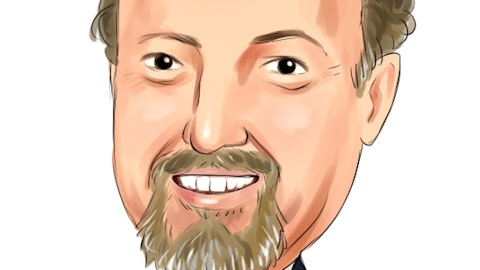In this piece we’ll take a look at the top five best health care stocks. For more stocks, head on to 12 Best Healthcare Stocks To Buy Now.
5. Pfizer Inc. (NYSE:PFE)
Number of Hedge Fund Holders: 79
Pfizer Inc. (NYSE:PFE) is an American healthcare company that is one of the largest of its kind in the world. The firm has a wide variety of medicines and vaccines that target diseases and disorders such as heart problems, COVID-19, endocrine system problems, and hemophilia.
One of the strongest points for Pfizer Inc. (NYSE:PFE) is the fact that the firm has more than 90 drugs in development in its pipeline. This lends stability to its future and the top two drugs out of these have a total addressable market value of $11 billion by 2027. The company also has a strong dividend yield of 3.19% as it pays 40 cents per share.
Morgan Stanley reduced Pfizer Inc. (NYSE:PFE)’s share price target to $49 from $52 in July 2022, outlining that companies that will perform strongly in the latter half of this decade deserve strong attention. 79 out of the 912 hedge funds part of Insider Monkey’s Q1 2022 survey had held stakes in the company.
Pfizer Inc. (NYSE:PFE)’s largest investor is Cliff Asness’s AQR Capital Management which owns 10 million shares that are worth $554 million.
ClearBridge Investments mentioned the company in its Q4 2021 investor letter and outlined that:
“While the level of general turnover abated as we progressed through 2021, it remained high in one area: post-COVID-19 recovery plays. The concept behind this investment thesis was, and still is, straightforward: with the advent of effective vaccines, the path from pandemic to endemic is just a matter of time. As this transition occurs, the estimated excess savings of over $2 trillion built up on U.S. consumer balance sheets will unlock dramatic pent-up demand for experiences, especially global travel. This investment case seemed especially compelling when the Pfizer vaccine positively surprised markets in November 2020. As a result, we made post-COVID-19 stocks (which were trading well below our estimate of recovery value) a sizable theme within the portfolio. We understood this to be a more aggressive tilt in positioning because it required a major improvement in demand to catalyze fundamentals and drive price toward higher business values. While we accepted that recovery would not be smooth and that it would take time to deploy vaccines both domestically and globally, we decided that recovery was the logical path of least resistance and we were being well compensated for these risks.
4. Johnson & Johnson (NYSE:JNJ)
Number of Hedge Fund Holders: 83
Johnson & Johnson (NYSE:JNJ) is one of the oldest American companies to date as it was set up in 1886 and is based in New Brunswick, New Jersey. The company provides beauty, oral, and baby care products. Additionally, it also sells medicines for a variety of diseases such as arthritis, inflammatory bowel disease, and cancer.
Despite its scale, Johnson & Johnson (NYSE:JNJ)’s return on invested capital (ROIC) stands between 20% and 25%, ensuring that the firm converts its investments into profit. Additionally, the firm has an A+ rating for its dividends and has grown them for 59 years. Currently, Johnson & Johnson (NYSE:JNJ) pays a $1.13 dividend per share per quarter for a 2.61% yield.
UBS reduced Johnson & Johnson (NYSE:JNJ)’s share price target to $180 from $185 in July 2022, citing worries about macroeconomic risks. Insider Monkey polled 912 hedge funds for this year’s first quarter and discovered that 83 had invested in the company.
Johnson & Johnson (NYSE:JNJ)’s largest investor is Peter Rathjens, Bruce Clarke, and John Campbell’s Arrowstreet Capital which owns 6.6 million shares that are worth $1.1 billion.
3. Merck & Co., Inc. (NYSE:MRK)
Number of Hedge Fund Holders: 84
Merck & Co., Inc. (NYSE:MRK) is an American healthcare company providing products for both human and animal health. Some of the diseases that its products target are cancer, neurological diseases, and diabetes. The firm is based in Kenilworth, New Jersey.
Merck & Co., Inc. (NYSE:MRK) has its eyes on the future as it currently has eight drugs under development and it is also expanding the scope of its current ones to target more diseases. Furthermore, the firm’s dividend has a CAGR of 8.8% over the past five years and has been growing consistently for more than a decade. Merck & Co., Inc. (NYSE:MRK) pays out a 69 cent quarterly dividend for a high 3.1% yield.
Barclays raised Merck & Co., Inc. (NYSE:MRK)’s share price target to $101 from $97 in July 2022, outlining that the firm performed strongly in its recent earnings. Insider Monkey profiled 912 hedge funds during this year’s first quarter and discovered that 84 had invested in the company.
Merck & Co., Inc. (NYSE:MRK)’s largest investor is Ken Fisher’s Fisher Asset Management which owns 11 million shares that are worth $970 million.
Carillon Tower Advisers mentioned the company in its Q1 2022 investor letter. Here is what the fund said:
“Merck (NYSE:MRK) is a global pharmaceutical and chemicals company based in Germany. Shares fell along with other vaccine-linked names after the U.S. Supreme Court blocked a rule mandating that businesses with more than 100 employees require those employed to either be vaccinated or tested weekly.”
2. Thermo Fisher Scientific Inc. (NYSE:TMO)
Number of Hedge Fund Holders: 101
Thermo Fisher Scientific Inc. (NYSE:TMO) is a life science and diagnostics equipment provider headquartered in Waltham, Massachusetts, United States. The firm provides several products that are used in laboratories and by companies to manufacture biopharmaceuticals.
Thermo Fisher Scientific Inc. (NYSE:TMO) is one of the more stable stocks out there, as close to 89% of its shares are owned by institutional investors, which leaves the shares immune to wild market swings. Additionally, the firm will benefit from the current wave of the coronavirus pandemic, as it is one of the largest providers of diagnostic tests. These tests saw a rival upgrade its earnings guidance by roughly $1.5 billion earlier in July 2022. Thermo Fisher Scientific Inc. (NYSE:TMO) pays a 30 cent dividend for a 0.2% yield.
Barclays lowered Thermo Fisher Scientific Inc. (NYSE:TMO)’s share price target to $630 from $675 in July 2022. However, the investment bank said that the company’s tools business will weather the recessionary storm. Out of the 912 hedge funds part of Insider Monkey’s Q1 2022 survey, 101 had invested in the company.
Out of these, Ken Fisher’s Fisher Asset Management is Thermo Fisher Scientific Inc. (NYSE:TMO)’s largest investor. It owns 2.2 million shares that are worth $1.3 billion.
Stewart Asset Management mentioned the company in its Q2 2022 investor letter. Here is what the fund said:
“Recently we initiated two new investments. One in Thermo Fischer Scientific (NYSE:TMO), a supplier to the life sciences industry. We have followed the company for many years and the recent downturn in share price gave us a good entry price at which to invest. Thermo has had strong earnings growth for many years and is led by a superb team. The company’s recent acquisitions make it a full-service supplier to the biopharma and biotech industries.”
1. UnitedHealth Group Incorporated (NYSE:UNH)
Number of Hedge Fund Holders: 103
UnitedHealth Group Incorporated (NYSE:UNH) is a healthcare plans and other associated products provider headquartered in Minnetonka, Minnesota, United States. The firm provides health care coverage, benefits, and other plans alongside other products that allow for physician access.
UnitedHealth Group Incorporated (NYSE:UNH) is one of the strongest dividend stocks when it comes to growth. The firm’s dividends have had a CAGR of 24.4% for the last ten years and CAGRs of 18% and 17% for the previous five and three years, respectively. It pays a $1.65 dividend per share for a 1.22% yield.
Argus raised UnitedHealth Group Incorporated (NYSE:UNH)’s share price target to $650 from $580 in July 2022, citing optimism for its business segments. Insider Monkey scanned 912 hedge funds during this year’s first quarter to find out that 103 had bought the company’s shares.
UnitedHealth Group Incorporated (NYSE:UNH)’s largest investor is Boykin Curry’s Eagle Capital Management which owns 2.9 million shares that are worth $1.4 billion.
In its Q2 2022 investor letter, Wedgewood Partners mentioned the company and stated:
“UnitedHealth Group also contributed to performance during the quarter. United’s operating income grew +3% on difficult year-ago comparisons as benefits members utilized more services compared to last year. Optum Health grew operating income +40% as more patients are enrolled in the Company’s value-based care services. The Company estimates nearly a third of all medical care is unnecessary and represents an opportunity to capture savings for both patients. Optum’s integrated platform of patient data, IT, and service providers are focused on driving out these unnecessary costs and should serve as the engine for long-term, mid-teens earnings per share growth.”
Disclosure: None. You can also take a look at 10 Electric Car Stocks to Buy for 2022 and 10 Best Data Center Stocks To Invest In.





